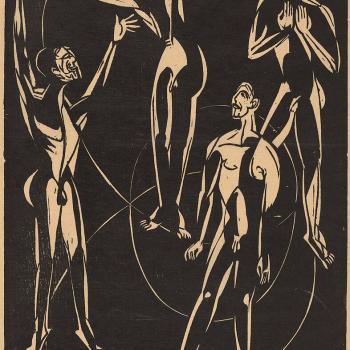
Because, frankly, I haven’t seen one.
At liturgy, I have yet to come across the ruins of East Aleppo re-constructed (or recently destructed) before the Iconostasis; every week we manage to avoid stealing the priest’s hand-cross in a bid for clerical authority. The Ultramontanists and Conciliarists have yet to come to open blows.
But perhaps that’s because that church is Byzantine. And yet, at daily Mass I have seen little hand-wringing, even as our two priests—one, a kind and pious cleric from Opus Dei, the other a cheerful and godly diocesan clerygman with a love for the Franciscans—manage to set a liturgical schedule, offer Adoration, and hear confessions. The Burkeans and the Francists have yet to spill blood in the aisles of our church like the henchmen of Henry II.
Even my mostly-Catholic town remains unspotted by violence; Deo gratias, I have yet to see entrails spilled in the streets or fires burn high, fed by the pages of the heretical Amoris Laetitia.
Kidding aside, when I read articles like this, or this, or even this, I cannot help but ask myself where this war is (and that is without invoking websites that one expects to predict schism: see here, here, and here). Witnessing all this, I must cry out: who calls for schism? Who in the Catholic Church is in the business of predicting and fomenting division? Isn’t that how most of these pieces feel: prognostication in the face of danger, soothsaying in a time of suffering?
It’s one thing to think schism may come, another to cry the word at every turn. It seems a bit like madness.
And yet, I cannot just lay the blame on those who are upset; their anger, the deep roots of their dissatisfaction, leads them to attempt to exercise the gift of prophecy. For, even as they criticize Francis as the media-friendly pope, the one who prays in the streets like the Pharisees, they themselves are victims of our age.
The internet has given the average person great responsibility. Unfortunately, contrary to the dreams of our Enlightenment predecessors (and lots of computer scientists and engineers), its invention has not meant an increase in knowledge (see: fake news) or our global transformation (though, as a product of much time spent on the internet as a kid, I cannot deny that it does much good). What it does allow, unequivocally, is the expression of our opinions without humility; it makes possible our insulation within particular spheres of news coverage. Faux-enlightened by drinking deep from such fountains of belief, we can offer our opinion on anything and everything. Ideology replaces humble consideration.
How often on the internet will one hear “I haven’t given that enough consideration” or “I need to think it over; I don’t know all the information?” It happens, but rarely. Rather, the internet makes possible easy self-satisfaction; it proffers us the self-assurance of a well-reasoned position, the pride of a fully-formed voice. And worst of all: it does this for everyone. I, an English PhD student, can make sweeping claims about Pope Francis, theology, sex, drugs, Kierkegaard, and meme culture right here on my blog and no one can stop me—such is the fruit of our age.
This self-assurance lies behind such prognostication; it feeds the bitterness of both sides as non-experts drink deep from the cup of ideology. The only possible answer can be humility (and maybe humility leads to a schism; I have no idea. But I’ll take a humble schism over fire-breathing any day). But how to develop it?
Prayer and fasting, almsgiving and self-mortification. What other answers have there ever been?













